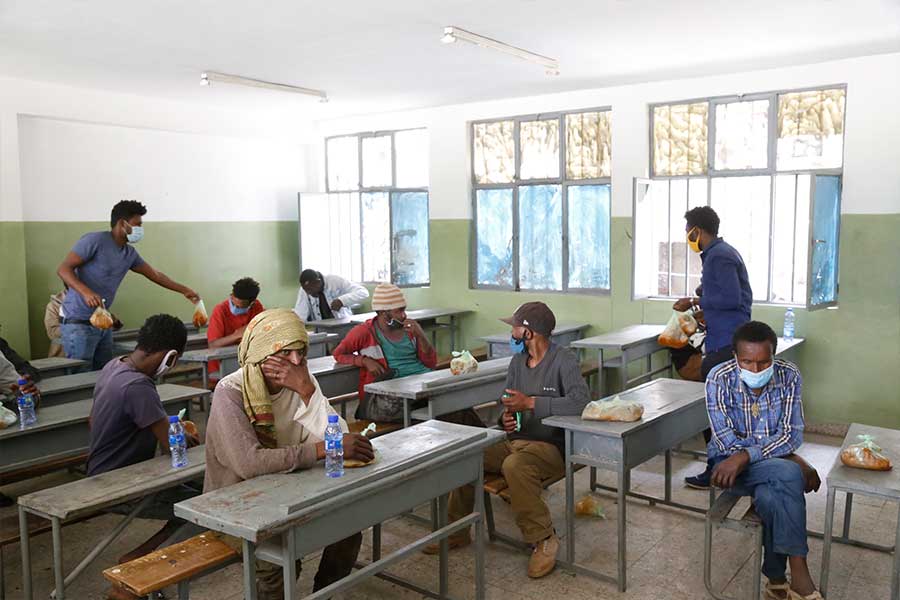
Mar 30 , 2019
By Getaneh Abera
April 2, World Autism Awareness Day, aims to put a spotlight on the hurdles that people with autism and their families face every day. Western countries have put in a great deal of research on this developmental disorder, raising awareness, service provisions and policy formulations.
Awareness about the disorder is showing improvement in Ethiopia, but there remains much that is still unknown and misunderstood. The number of children who are diagnosed with autism is estimated to be increasing, but the amount of dedicated health providers remains constant.
No specific policy considers autism as a specific case. We are in a country where psychological and developmental disorders do not carry as much currency in the medical profession, and special needs education has barely gotten off the ground.
Worse still, autism has not broken through social barriers and continues to be attached to myths that are making addressing the problem more challenging.
One of the most widespread beliefs is that the symptoms of the disorder have a spiritual cause. What is usually recommended, out of desperation as well as awareness by parents, are spiritual interventions. Hospitals usually are not the first choice for treatment for someone with a mental health problem, especially in rural areas.
Some research shows that faith has a positive influence on people’s mental states, but the view that an evil spirit causes autism is dangerous. It causes stigma and discrimination, even by parents, and the methods used to rid oneself of this social as well as mental problem can potentially worsen the condition of the children.
Another harmful myth about autism is that it is transmittable, leading to further discrimination and marginalisation of those affected by it. That autism is contagious, like the flu, is a surprisingly common theory in religious places and schools.
“It is not my son being autistic that hurts me,” a mother once told me. “In case my son and I pass by the field where children are playing, they run away like they have seen a wild animal. I know they don’t feel this way; it is their parents who tell them that it is transmittable.”
The causes of autism, which affects millions of people around the world, are more genetic or associated with environmental factors. This simple awareness can go a long way in getting communities to pitch in to address this problem.
Just as frustrating a myth associated with the disorder is that of aggressiveness. Autistic children do not deliberately attack their peers or anyone else. They do not seriously think about how to hurt or attack someone. But they could be easily manipulated into doing this.
Otherwise, aggression may happen due to sensory overload or the frustration from their inability to communicate or express themselves. This myth is common in schools and with teachers.
This comes from a lack of understanding of the children’s conditions and special needs. There are multiple examples of how nonverbal and “aggressive” children that were sent to autism centres showed incredible progress in both communication and academics by the time they were promoted to mainstream schools.
What is harmful is expecting children with this disorder to act and show the same level of social communication skills that kids without autism have. Under the right treatment packages and proper awareness of the behaviour patterns of these children, there are chances of bringing them up to speed.
Without a national policy and a community to contribute its fair share in helping these children and their parents though, the problem will persist, and early recognition and treatment possibilities will dissipate.
PUBLISHED ON
Mar 30,2019 [ VOL
19 , NO
987]


Radar | Apr 17,2020

Commentaries | Aug 21,2021

My Opinion | Jun 12,2021

Fortune News | Jun 14,2020

Covid-19 | Mar 14,2020

Radar | Apr 03,2023

Radar | Apr 10,2021

Viewpoints | Jul 09,2022

Fortune News | Jul 28,2024

Commentaries | Dec 19,2020

Photo Gallery | 174163 Views | May 06,2019

Photo Gallery | 164385 Views | Apr 26,2019

Photo Gallery | 154520 Views | Oct 06,2021

My Opinion | 136646 Views | Aug 14,2021
Editorial | Oct 11,2025

Dec 22 , 2024 . By TIZITA SHEWAFERAW
Charged with transforming colossal state-owned enterprises into modern and competitiv...

Aug 18 , 2024 . By AKSAH ITALO
Although predictable Yonas Zerihun's job in the ride-hailing service is not immune to...

Jul 28 , 2024 . By TIZITA SHEWAFERAW
Unhabitual, perhaps too many, Samuel Gebreyohannes, 38, used to occasionally enjoy a couple of beers at breakfast. However, he recently swit...

Jul 13 , 2024 . By AKSAH ITALO
Investors who rely on tractors, trucks, and field vehicles for commuting, transporting commodities, and f...

Oct 11 , 2025
Ladislas Farago, a roving Associated Press (AP) correspondent, arrived in Ethiopia in...

Oct 4 , 2025
Eyob Tekalegn (PhD) had been in the Governor's chair for only weeks when, on Septembe...

Sep 27 , 2025
Four years into an experiment with “shock therapy” in education, the national moo...

Sep 20 , 2025
Getachew Reda's return to the national stage was always going to stir attention. Once...

Oct 12 , 2025
Tomato prices in Addis Abeba have surged to unprecedented levels, with retail stands charging between 85 Br and 140 Br a kilo, nearly triple...

Oct 12 , 2025 . By BEZAWIT HULUAGER
A sweeping change in the vehicle licensing system has tilted the scales in favour of electric vehicle (EV...

Oct 12 , 2025 . By NAHOM AYELE
A simmering dispute between the legal profession and the federal government is nearing a breaking point,...

Oct 12 , 2025 . By NAHOM AYELE
A violent storm that ripped through the flower belt of Bishoftu (Debreziet), 45Km east of the capital, in...